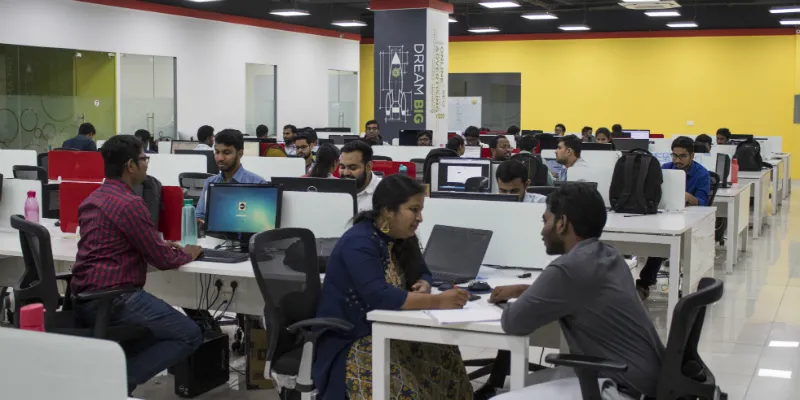Need an app built in 15 minutes? ONGO Framework is automating app & web development for SMEs around the world
In 2011, Artificial Intelligence (AI) was in its infant stage across industries in Indian companies. Around the same time, budding entrepreneur Rama Krishna Kuppa was working at Mindtree. He was a member of the team developing the Norton Ghost and Symantec Recovery Environment. The team had identified a need in migrating 32-bit systems to 64-bit, and there were more than 500 modules.
He thus struck upon the idea for a framework that allowed automation of technology, such as apps and web development. He wanted to develop an automation platform feasible for accelerating digital transformation of all kinds of businesses.
With this mission in mind, he launched ONGO Framework in the same year. ONGO is a Hyderabad-based business which works with global clients and provides them with IT and digital solutions.
It executes all its actions, such as app development for web and mobile (both iOS and Android), ERP, CRM, and industry-driven solutions, on its framework named ‘ONGO.’ The key USP of this automated framework is its ability to build an app within 15 minutes.
“The company was bootstrapped when it started and was led by my family. Later, Mitesh Majithia, a Harvard Business school alumni and a serial investor, invested in the company,” says Rama Krishna Kuppa, Founder and CEO, ONGO Framework. “In the recent round of funding, ONGO has raised investments from a few other angel investors.”
The company grew by 100 percent during the previous quarter. The key driver was the significant rise in traction from a number of large enterprises, large collaborators, professional bodies, and major cloud infrastructure platforms adopting ONGO’s solutions. It’s annual SaaS revenue is Rs 7.16 crores, which is growing at the rate of 35.5 percent QoQ and 300 percent annually.
In an interaction with SMBStory, Rama Krishna Kuppa, Founder and CEO, ONGO Framework, explains more about the business and how it is helping enterprises transform their digital capabilities.
SMBStory: What were you doing prior to Mindtree and ONGO?
Rama Krishna Kuppa: I have spent years gathering expertise in low-code rapid application development by integrating the latest cognitive technologies such as AI, Machine Learning and Deep Learning. I believe if I can automate the development process, I can drastically decrease the time taken in app/solution building.
Before ONGO Framework, I helped CreativeXperts as a technology mentor. And prior to this, I was a technologist at Hitachi and Motorola. I later joined Mindtree. Throughout these years, I derived technology strategies for enterprise mobility and large-scale enterprise systems. I played a vital role in unveiling technology revolutions to small and medium enterprises.
With a major focus on enterprise mobility and digitisation of business processes, my curiosity to integrate technology to build better IT infrastructure never stopped even after ONGO. My vision drives me to move ONGO Framework in the magic quadrant of A-PaaS vertical. I also obtained a Masters’ degree in Information Systems, and I continue to research Cognitive Computing.

The ONGO Framework team
SMBS: What categories did ONGO diversify into?
RKK: Due to in-built Machine Learning, ONGO is a self-learning framework. As it works with more and more clients, the platform becomes more robust to deliver seamlessly any upcoming challenge. As of now, ONGO identified 10,300 sub-categories. Out of this, 435 categories are fully matured on the AI-based framework.
We primarily employ digital to enhance customer experience. With this goal in mind, we deliver technology based on user profile, be it in B2B, B2C, B2B2C, or C2C scenario. We thus aid business functions such as schedule appointments, buy products, marketing, customer or partner service, supply chain, and inventory etc.
SMBS: What is the market size of your sector and how is ONGO different from the competition?
RKK: The global low-code platform market is projected to be $ 126 billion by 2025. During the forecast period from 2017 to 2025, the market will exhibit a record 54.5 percent CAGR. The growing demand for low code development platforms in industries such as healthcare, manufacturing, IT and telecom, government, BFSI, and education is expected to reinforce the growth of the low code development platform market over the forecast period.
A majority of the low-code players are either UI focused or category focused. ONGO is different since it is an AI-based low-code/no-code solution delivery model. And with the maturity of AI, ONGO aims be more no-code. This opens up the SME market.
Already, we have around 50 million SMEs registered. The need of the hour for them is digital transformation. The scope to provide category-specific transactional behaviour for those businesses is never-ending.
For them, we deliver technology in quick time with low-code or no-code machine learning capabilities and we have a keen eye on AI learning for every category. The in-built AI allows us to confront challenges without hesitation and permit automation of development while decreasing development times by between 60 to 95 percent. The platform is also recursive.
SMBS: How is ONGO working with MSMEs?
RKK: ONGO’s primary goal is to make technology affordable to MSMEs and ensure ease of doing business on digital platforms. This digital transformation for MSMEs has three factors. First is the cost of technology, the second is the cost of infrastructure, and the third is the cost of customer acquisition and adoption. For them, we deliver technology in an affordable SaaS model.
We also launched our ‘create and sell’ model with our channel partners. ONGO partners with SME service providers such as listing companies, domain hosting providers, SEO, payment gateways etc, to reduce the cost of customer acquisition. Thus, we are able to focus on the three major elements in allowing digital transformation of MSMEs.
For technology, we ensure that SMEs don’t have to worry about any technology challenge. The client gets the technology with minimum capex and in a SaaS model. Next, thanks to the technology provided by ONGO, SMEs have a minimum acquisition cost. Further, we ensure scalability and easy maintenance for clients using the ONGO framework and ecosystem. Moreover, ONGO has collaborated with one of the largest cloud infrastructure providers, Alibaba Cloud, as a channel partner. With this, we ensure digital transformation of thousands of small businesses.

ONGO Framework's Hyderabad office
SMBS: What has been the impact of your work on other customers?
RKK: Building an app through ONGO Framework is significantly low as there is no dependency on the integration of any component. It is either UI/UX or backend. In this process, every consumer is digitised, making the affordability of technology higher and allowing faster digital transformation.
Therefore, we have given our clients a robust digital presence in minutes, the ability to deliver superior customer experience, and easy access to technology.
For instance, when ONGO Framework works with a startup, the delivery time is significantly reduced, and hence, decreases the time to go to market. This reduces the capex and allows the business to focus on the operational expenditure.
SMBS: What are your challenges in terms of sustaining and growing the business?
RKK: Judging and adopting the needed technology for SMEs is the biggest challenge. And with the dynamic changes in the digital landscape of customer experience, keeping pace with SMEs’ expectations is getting more complex.
This opens the opportunity to have a technology ecosystem which delivers 360-degree digitisation and customised technology solutions in a relatively quick time and with affordable models. These USPs have helped us embrace the entire spectrum of businesses, i.e, from MSMEs to big enterprises.
Acceptance of customised apps in the SAAS model as we redefine solution with our SaaS is also challenging. It is sure that SAAS would be the future. However, the early onset of our services in SaaS makes it a challenge. SaaS is not a quick win. We need to be persistent and consistent in order to be established. Once we are adapted to it, we will succeed. In the near future, we want to enter the Middle East, North Africa, and the US.






![[TechSparks 2020] FM Nirmala Sitharaman 'closely monitoring' progress of MSMEs; says they will help India become Aatmanirbhar Bharat](https://images.yourstory.com/cs/21/e1da3a20368f11ea8ceed32dbcb77ccc/Imageibd5-1603888069440.jpg?mode=crop&crop=faces&ar=1%3A1&format=auto&w=1920&q=75)
